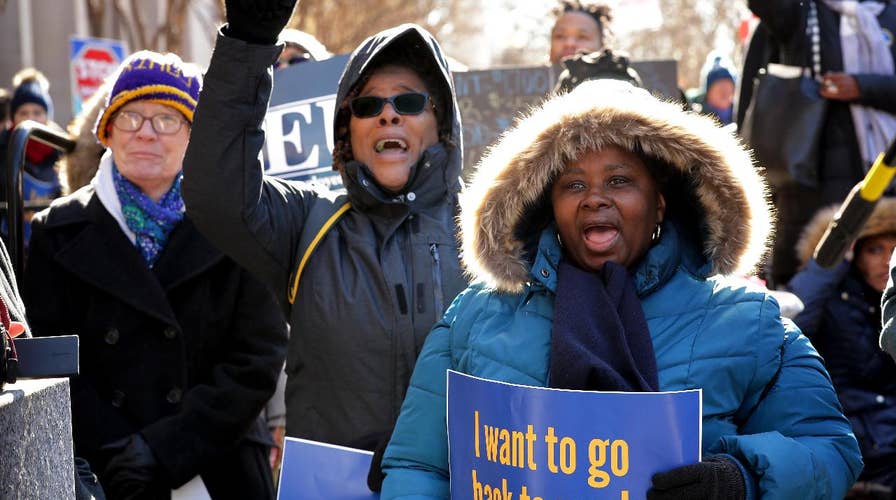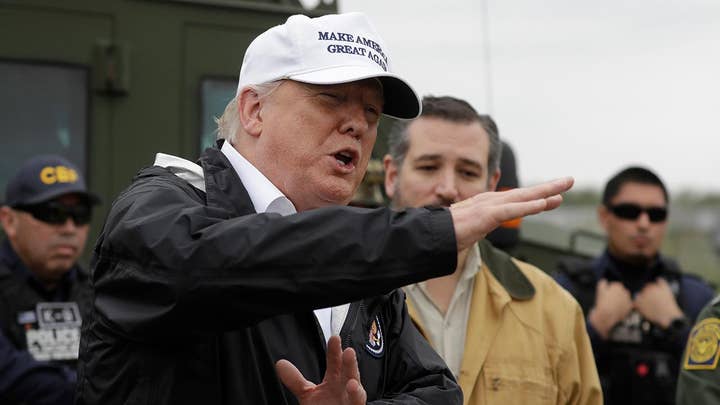Federal workers rally nationwide for political leaders to end shutdown
Government workers staged rallies in D.C. and beyond as political leaders are at a stalemate over how to reopen the government amid an almost three week-long partial shutdown.
The impact of the partial government shutdown intensified on Friday, as hundreds of thousands of federal workers missed their first paychecks since the funding lapse last month -- a situation putting rising pressure on Congress and the White House to reach an agreement to re-open shuttered agencies.
Friday marks the 21st day of the shutdown, and the first payday without paychecks for at least 800,000 workers who have been forced to work without pay, or simply stay home, while lawmakers and President Trump remain locked in a standoff over border security funding. Most workers were issued their last paycheck two weeks ago, and it is unclear if and when they will receive the next.
TRUMP, EN ROUTE TO BORDER, RAMPS UP WARNING HE COULD DECLARE A NATIONAL EMERGENCY
Some federal workers have had to apply for unemployment benefits and take out loans to stay afloat; while others have had to cancel trips and scale back spending in other ways. Statistics provided by the Department of Labor showed that 4,760 federal employees filed for unemployment benefits in the last week of December, an increase of 3,831 from the 929 who applied the week before.
Democrats have increasingly sought to make federal workers the face of the shutdown in recent days, amid reports that hundreds of unpaid Transportation Security Administration (TSA) officials are calling out sick at airports.
"[Trump] thinks maybe they could just ask their father for more money," House Speaker Nancy Pelosi said after a contentious meeting at the White House on Wednesday. "But they can’t." Trump walked out of the meeting after Pelosi flatly refused to consider any spending bill that included wall funding.
Trump has said that "most of the people not getting paid are Democrats," but last weekend, empathized with the federal workers who have gone without pay.
"I can relate," Trump told reporters last weekend. "And I’m sure that the people that are on the receiving end will make adjustments. They always do. And they’ll make adjustments. People understand exactly what’s going on. Many of those people that won’t be receiving a paycheck, many of those people agree 100 percent with what I’m doing."
“There is not gonna be any bend right here," Trump added.
The partial shutdown of the federal government began on Dec. 22, after Trump requested $5.7 billion in funding for border security and construction of the wall—a proposal Democrats vowed to block. House Democrats have moved bills that would fund government agencies but not Trump's border wall request.
On Thursday, while the president traveled to McAllen, Texas in an effort to highlight the “humanitarian crisis” at the border – a crisis that Democrats claim is “manufactured” – rallies were held in cities across the country with federal workers protesting the shutdown.
Two large unions representing federal workers—the American Federation of Government Employees and the National Treasury Employees Union—have brought lawsuits arguing it is illegal to force workers to show up to their jobs without pay.
AS PARTIAL GOVERNMENT SHUTDOWN CONTINUES, CAN TRUMP DECLARE AN EMERGENCY? A LOOK AT WHAT THAT MEANS
But several plans have been passed in the House and the Senate, as lawmakers on both sides of the aisle attempt to take first steps at re-opening the government.
On Thursday, the Senate passed legislation to approve back pay for federal workers furloughed during the ongoing shutdown, as Senate Majority Leader Mitch McConnell, R-Ky., offered assurances it would be a bill the president would sign.
In the House, appropriations bills to reopen sections of the government like financial services, transportation, housing and agriculture all passed. All Democratic lawmakers voted ‘yea’ on the packages, while a dozen Republicans also voted to approve the transportation and housing bills.
Despite Trump’s stalemate with Democratic congressional leadership, Trump has declared that he will “almost definitely” use his emergency powers to build the wall if he cannot arrive at an agreement with congressional Democrats. Trump has said he is willing to “compromise.”
“Either we’ll win or make a compromise. I’m okay to make a compromise—compromise is in my vocabulary very strongly,” Trump said on Thursday. “I think a compromise is a win for everybody, otherwise, I can declare a national emergency.”
But some Senate Republicans, like Sen. Lindsey Graham, R-S.C., met with Jared Kushner this week to discuss a “grand bargain”—possible Deferred Action for Childhood Arrivals (DACA) concessions in exchange for border wall money.
CLICK HERE TO GET THE FOX NEWS APP
But congressional sources on both sides of the aisle told Fox News that the president personally killed that idea despite his willingness to “compromise.”
Instead of offering another proposal, Graham went on to simply urge the president to declare a national emergency.
“It is time for President Trump to use emergency powers to fund the construction of a border wall/barrier,” Graham said in a statement. “I hope it works.”
Fox News' Peter Doocy, Chad Pergram, Gregg Re and The Associated Press contributed to this report.














































